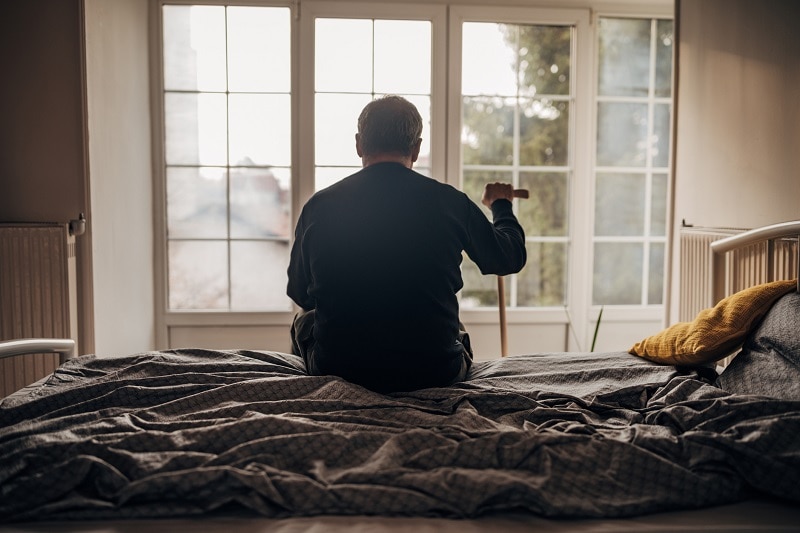[vc_row][vc_column][vc_column_text]If you're all over the map when it comes to sleeping, your brain could be paying for it.
We're not talking about how many hours of shut-eye you get a night, though that definitely affects your brain. We're talking about what time you go to bed and what time you wake up.
Recent
research suggests that people with “very irregular” sleep patterns may have a higher risk of getting dementia than people who go to bed and wake up on a more predictable schedule — a 53% higher risk, in fact.
Before you freak out over sliding into your Sundays later than the rest of your week, know that “the study does not prove that sleep irregularity causes
dementia. It only shows an association.” That's a direct quote from the American Academy of Neurology's
press release discussing the study's results, which were published in the organization's January 2024 medical journal.
You're probably wondering what “association” means in practical terms. It means what you think it means: that the two factors (irregular sleep and dementia) are related, or linked, and that a change in one results in a change in the other.
Here's a real-life example that makes that meaning understandable: People whose incomes are below the federal poverty threshold have a higher risk of getting lung cancer (there's an association between low socioeconomic status and lung cancer) — but that association doesn't mean that living with a lower income
causes lung cancer. Makes sense, right? Rather, folks with less money are subject to circumstances that could lead to getting lung cancer (less access to medical care, living or working in areas with polluted air, etc.).
In contrast, smoking causes lung cancer — an example of “causation.”
Science-y explanation aside, there's merit to the relationship between
sleep — how regular it is, its quality and how much of it you get — and dementia.

Dementia and Sleep: What is Dementia, and How Does Sleep Play a Role?
Dementia is a decline in
memory and other mental abilities, including decision-making and language. There are many types of dementia, but Alzheimer's Disease is the most common.
It's no surprise that lackluster, erratic or barely there sleep is
linked to dementia and in some cases puts people at considerably higher risk of
getting dementia. Many
studies have shown that sleep matters enormously for memory, cognitive abilities and brain health — even when we're not talking about dementia.
Specifically, deep sleep (non-REM slow-wave sleep) is critical to keeping memory robust. Your ability to remember something depends on getting adequate deep sleep before and after you come across it.
Deep sleep also works against sticky clumps of a toxic form of protein called beta-amyloid building up in your brain. In contrast, disrupted sleep has been associated with (there's the word associated again!) beta-amyloid accumulating faster in the brain. And beta-amyloid, which kills brain cells, is tied to memory loss.
The association between sleep irregularity and dementia
The recent
study on the relationship between erratic sleep and dementia uses a narrow definition of regularity: consistency of going to sleep at the same time every day and waking up at the same time every day.
The study followed about 88,000 people with an average age of 62. There was a fairly even split between men and women, and they were all in the United Kingdom.
For one week, participants wore a wrist device that let researchers determine the probability of them being asleep or awake at any two time points in time 24 hours apart. Someone who slept and woke at the exact same times every day had a “sleep regularity index” of 100, and someone who slept and woke at different times every day had a score of 0.
Using medical data, researchers discovered that 480 people in their study developed dementia over about seven years. Then they got busy looking at the sleep patterns of all the participants (after adjusting for age, sex and genetic risk of getting Alzheimer’s).
Here's what they found: Participants who had the most irregular sleep (they had an average score of 41) were at a 53% higher risk for getting the disease than those in the middling group, if you will, as far as regular sleep patterns (score of 60). Interestingly, the superstars of getting regular sleep (average score of 71), didn't show a lower risk of developing dementia than the middling group.
“Based on our findings, people with irregular sleep may only need to improve their sleep regularity to average levels, compared to very high levels, to prevent dementia,” said study author Matthew Paul Pase, PhD, of Monash University in Melbourne, Australia. “Future research is needed to confirm our findings.”
Bottom line
Sound sleep habits, no matter your age,
keep you healthier and make you sharper and more creative.
And sleep can help your brain even if you already have dementia. New
research guided by one of the best in the field, UC Berkeley professor of neuroscience and psychology Matthew Walker, suggests that deep sleep can mitigate dementia's memory loss.
What’s more, a regular sleep schedule ranks high on
researchers' recommendations for getting those deep zzzs:
- stick to a regular sleep schedule
- be mentally and physically active during the day
- minimize caffeine late in the day and screen viewing before bed
- take a warm shower before turning in for the night
- create a cool dark sleep environment[/vc_column_text][/vc_column][/vc_row][vc_row][vc_column][vc_text_separator title="Featured Products" border_width="2"][vc_row_inner equal_height="yes" content_placement="middle" gap="35"][vc_column_inner width="1/3"][vc_single_image image="174531" img_size="full" alignment="center" onclick="custom_link" img_link_target="_blank" css=".vc_custom_1713803048773{padding-right: 7% !important;padding-left: 7% !important;}" link="https://www.vitacost.com/provita-neuro-max"][/vc_column_inner][vc_column_inner width="1/3"][vc_single_image image="174525" img_size="full" alignment="center" onclick="custom_link" img_link_target="_blank" css=".vc_custom_1713803084776{padding-right: 7% !important;padding-left: 7% !important;}" link="https://www.vitacost.com/bach-rescue-sleep-liquid-melts-natural-sleep-aid"][/vc_column_inner][vc_column_inner width="1/3"][vc_single_image image="174573" img_size="full" alignment="center" onclick="custom_link" img_link_target="_blank" css=".vc_custom_1713888781582{padding-right: 7% !important;padding-left: 7% !important;}" link="https://www.vitacost.com/nfuse-225-mg-magnesium-body-lotion-relax-restore-lavender"][/vc_column_inner][/vc_row_inner][/vc_column][/vc_row]




